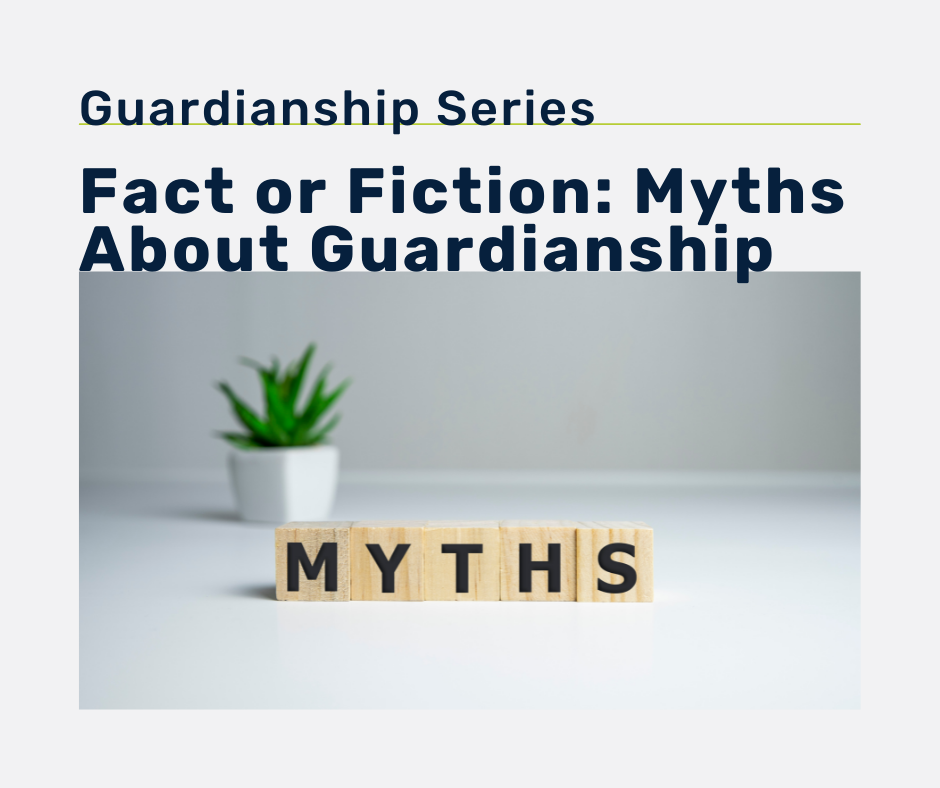There are many myths about guardianship that can impact an individual and/or family’s decision to pursue it. In this blog, we’ll examine several statements and use data to determine if they are fact (true) or fiction (false).
If I have a child with an I/DD diagnosis, Guardianship is needed.
Why it’s fiction: Each individual is impacted by their diagnosis (diagnoses) differently, so their decision-making is going to be different. Guardianship is not automatic, regardless of the diagnosis. You will need to prove to the court that their disability affects their decision-making to obtain guardianship.
If I am guardian, I can control social decisions like who or if my child/loved one dates, gets a tattoo or has sex.
Why it’s fiction: As a parent or caregiver, you may be able to influence these choices, similar to the way you may influence your neurotypical loved ones, but ultimately as guardian you don’t have a say in these matters. The right to make bad choices and mistakes is a fundamental human right that isn’t taken away because of guardianship.
If I have guardianship, this will help protect my child if they are questioned by law enforcement or charged with a crime.
Why it’s fiction: Interactions with law enforcement can be stressful. However, mental capacity in the criminal justice system is different than the decision-making capacity that you will prove to the court. Law enforcement may or may not contact you before questioning your loved one. The CO Legislature just passed legislation to increase training to police officers about people with disabilities. It may also be helpful to practice interactions with law enforcement so that your loved one knows what to do.
Individuals who have a guardian cannot vote in elections.
Why it’s fiction: This varies by states, but in Colorado if you have a guardian, you are still able to vote with your own ballot!
If I am a guardian, I am legally liable for financial decisions or for my loved one’s behaviors/actions such as destroying property or assaulting someone.
Why it’s fiction: Guardianship does not make you liable for their actions, just for making decisions on their behalf. However, there is liability if you abuse you power as guardian, such as misusing funds, etc.
As guardian, I can make medical and service-related decisions like medication compliance or which providers are used.
Why it’s fact: As a guardian, you can make medical and service-related decisions for the individual. However, you cannot have the individual institutionalized or committed without their consent. Additionally, guardians should make every effort to take the preferences and desires of the individual into account.
If I don’t want to be guardian, I can remove it later.
Why it’s fact (but): Removing guardianship is not easy. It’s much harder to prove to the court that someone can make decisions after you have already proved they cannot. If you are concerned that guardianship may not be needed, you might want to explore alternative options. Remember, you can apply for guardianship any time after 18.
As guardian, I can make the decision to move the individual out of state
Why it’s fiction: Most guardians don’t know that you have to request permission to move the individual out of state. This needs to be done before you move the individual out of state. You would also need to look into the transferring guardianship to that other state. You can remain the guardian, but you’ll need to make sure you understand the rights and responsibilities of a guardian in the new state.
If I’m guardian, I will have to house and care for the individual in my home. I will also have to use my own money to care for them.
Why it’s fiction: Again, being guardian is NOT the same as being a parent. A guardian does not have to live in the same state as the individual they support. As guardian you are responsible for making decision on their behalf and being involved in their care. This would mean knowing their case manager or service provider and attending relevant meetings, like a service plan meeting.
As guardian the individual has to do what I say
Why it’s fiction: Guardianship is limited in scope. The individual still retains the basic human right of being able to make choices. As a guardian, the statute mandates you take their preferences, desires and values into account.. It is not about imposing your values or preferences on the individual.
Guardianship is the only option to support an individual with intellectual and developmental disabilities
Why it’s fiction: There are many other less restrictive options that may work better for your loved one and you! Some of those include supported decision-making agreements, power of attorney, limited guardianship, or other decision-making tools. We’ll explore those options in the next blog posts.
To Learn More:
The Arc US: Myths About Guardianship

